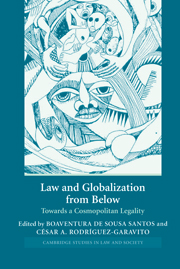Book contents
- Frontmatter
- Contents
- Notes on the contributors
- 1 Law, politics, and the subaltern in counter-hegemonic globalization
- PART ONE LAW AND THE CONSTRUCTION OF A GLOBAL ECONOMY OF SOLIDARITY
- 2 Beyond neoliberal governance: the World Social Forum as subaltern cosmopolitan politics and legality
- 3 Nike's law: the anti-sweatshop movement, transnational corporations, and the struggle over international labor rights in the Americas
- 4 Corporate social responsibility: a case of hegemony and counter-hegemony
- 5 Campaigning for life: building a new transnational solidarity in the face of HIV/AIDS and TRIPS
- 6 Negotiating informality within formality: land and housing in the Texas colonias
- 7 Local contact points at global divides: labor rights and immigrant rights as sites for cosmopolitan legality
- PART TWO TRANSNATIONAL SOCIAL MOVEMENTS AND THE RECONSTRUCTION OF HUMAN RIGHTS
- PART THREE LAW AND PARTICIPATORY DEMOCRACY: BETWEEN THE LOCAL AND THE GLOBAL
- Index
- References
5 - Campaigning for life: building a new transnational solidarity in the face of HIV/AIDS and TRIPS
Published online by Cambridge University Press: 07 July 2009
- Frontmatter
- Contents
- Notes on the contributors
- 1 Law, politics, and the subaltern in counter-hegemonic globalization
- PART ONE LAW AND THE CONSTRUCTION OF A GLOBAL ECONOMY OF SOLIDARITY
- 2 Beyond neoliberal governance: the World Social Forum as subaltern cosmopolitan politics and legality
- 3 Nike's law: the anti-sweatshop movement, transnational corporations, and the struggle over international labor rights in the Americas
- 4 Corporate social responsibility: a case of hegemony and counter-hegemony
- 5 Campaigning for life: building a new transnational solidarity in the face of HIV/AIDS and TRIPS
- 6 Negotiating informality within formality: land and housing in the Texas colonias
- 7 Local contact points at global divides: labor rights and immigrant rights as sites for cosmopolitan legality
- PART TWO TRANSNATIONAL SOCIAL MOVEMENTS AND THE RECONSTRUCTION OF HUMAN RIGHTS
- PART THREE LAW AND PARTICIPATORY DEMOCRACY: BETWEEN THE LOCAL AND THE GLOBAL
- Index
- References
Summary
INTRODUCTION
In a dramatic display of political astuteness, six hundred volunteers under the banner of the Treatment Action Campaign, a non-government organization dedicated to ensuring access to treatment for the millions of South Africans infected with HIV/AIDS, commemorated human rights day in South Africa in 2003 by marching on the same police station at Sharpeville where anti-apartheid protestors had been gunned down on March 21, 1960. Symbolizing the number of South Africans dying each day from HIV/AIDS-related illnesses, the demonstrators demanded that the government immediately agree to establish an antiretroviral treatment program in the public health sector. At the same time, fellow TAC protestors in Durban and Cape Town highlighted the urgency of their demands by laying formal charges of culpable homicide against the Minister of Health as well as the Minister of Trade and Industry whom they accused of negligently failing to act and thus of causing the deaths of thousands of AIDS sufferers.
This campaign reflects a situation in marked contrast to the day nearly a decade before in May 1994, when Nelson Mandela, in his first official exercise of power as President of South Africa, announced that free health services must be provided to all children under the age of six and to pregnant women. Yet, unlike the over forty-year struggle against apartheid, within a year the government had conceded that the public sector must provide treatment and was instead embroiled in a debate over the pace of implementation of the promised program.
- Type
- Chapter
- Information
- Law and Globalization from BelowTowards a Cosmopolitan Legality, pp. 118 - 139Publisher: Cambridge University PressPrint publication year: 2005
References
- 14
- Cited by



